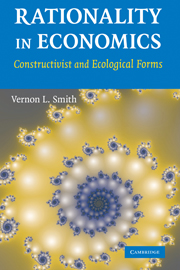Book contents
- Frontmatter
- Contents
- Preface
- Acknowledgments
- Introduction
- PART I RATIONALITY, MARKETS, AND INSTITUTIONS
- PART II IMPERSONAL EXCHANGE: THE EXTENDED ORDER OF THE MARKET
- PART III PERSONAL EXCHANGE: THE EXTERNAL ORDER OF SOCIAL EXCHANGE
- 9 Emergent Order without the Law
- 10 The Effects of Context on Behavior
- 11 Investment Trust Games: Effects of Gains from Exchange in Dictator Giving
- 12 Reciprocity in Trust Games
- PART IV ORDER AND RATIONALITY IN METHOD AND MIND
- References
- Index
12 - Reciprocity in Trust Games
Published online by Cambridge University Press: 18 May 2010
- Frontmatter
- Contents
- Preface
- Acknowledgments
- Introduction
- PART I RATIONALITY, MARKETS, AND INSTITUTIONS
- PART II IMPERSONAL EXCHANGE: THE EXTENDED ORDER OF THE MARKET
- PART III PERSONAL EXCHANGE: THE EXTERNAL ORDER OF SOCIAL EXCHANGE
- 9 Emergent Order without the Law
- 10 The Effects of Context on Behavior
- 11 Investment Trust Games: Effects of Gains from Exchange in Dictator Giving
- 12 Reciprocity in Trust Games
- PART IV ORDER AND RATIONALITY IN METHOD AND MIND
- References
- Index
Summary
… Humboldt quotes without a protest the sneer of the Spaniard, “How can those be trusted who know not how to blush?”
Darwin (1872; 1998, p. 317)The questions you ask set limits on the answers you find. …
Grandin and Johnson (2005, p. 281)The fundamental fact here is that we lay down rules, a technique, for a [language] game, and that when we then follow the rules, things do not turn out as we assumed. That we are therefore, as it were, entangled in our own rules. The entanglement in our rules is what we want to understand.
Wittgenstein (1963; quoted in Strathern, 1996, p. 65)Introduction
Extensive experimental studies have established the truth that the amount of giving in ultimatum and dictator games is greater than predicted by standard economic theory based on an especially unsophisticated form of self-interest defined as always choosing dominant outcomes, whatever the circumstances. The replicable results from these games alone, however, are subject to overinterpretation in terms of social utility without testing this interpretation in less restrictive interactions.
Thus, “Since the equilibria are so simple to compute … the ultimatum game is a crisp way to measure social preferences rather than a deep test of strategic thinking” (Camerer, 2003, p. 43). You do not generally learn more about the wellsprings of behavior by constraining choice and suppressing opportunity cost as it arises in more relaxed environments.
- Type
- Chapter
- Information
- Rationality in EconomicsConstructivist and Ecological Forms, pp. 245 - 280Publisher: Cambridge University PressPrint publication year: 2007



